How to eat Mediterranean style
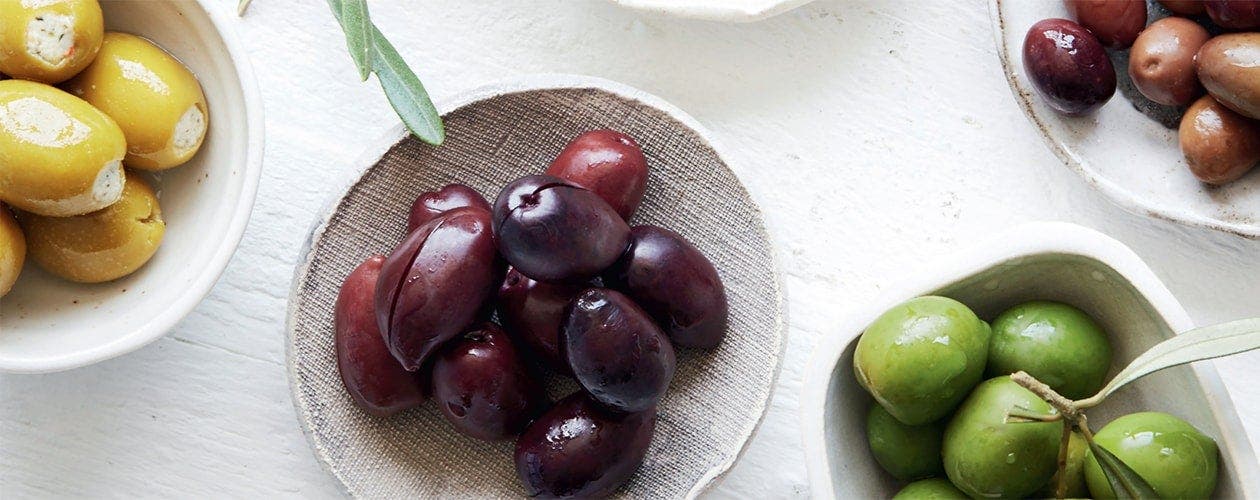

10 tips for Mediterranean cooking
The Mediterranean diet is popular because of extensive research on its health benefits particularly for heart health and weight management. The good news? You don’t need to live near a Greek Island to enjoy the benefits! The following tips and shopping list will have you cooking up delicious and healthy Mediterranean style dishes in no time.
1. Eat primarily plant-based foods such as fruit and vegetables, wholegrains, herbs, legumes and nuts.
2. Add vegetables to every main meal, with an emphasis on leafy greens and tomato products.
3. Include at least two pulse or legume meals (such as dried peas, lentils or beans such as cannellini, borlotti or red kidney) a week.
4. Limit red meat to small portions and consume only once or twice a week.
5. Enjoy fish and seafood at least twice a week, and include oily varieties such as salmon, sardines and mackerel.
6. Use natural, unsweetened yoghurt as a dairy food for everyday use, with cheese in moderation.
7. Use olive oil as the main healthy fat in place of butter or margarine.
8. Choose fresh fruit and nuts as snacks rather than processed foods.
9. Use herbs and spices instead of salt to flavour foods.
10. Save sweet treats and desserts for celebrations or family gatherings.
Foods that help you go Mediterranean with your meals
Here are the mainstays of a Mediterranean-inspired grocery list.
Heathy fats and oils
- Extra-virgin olive oil: This serves as the primary source of dietary fat in the Mediterranean diet, so using it for flavour, when cooking or as a part of dips and dressings, is welcome and encouraged! This and other plant-based oils (see below) are filled with polyphenolic compounds, a type of powerful antioxidant that’s been linked to longevity and may help you reduce risks of chronic diseases on the whole.
- Plant-based oils: You’ll also enjoy other plant-based oils, such as canola, sesame, peanut, flaxseed, and hempseed, plus other nut-derived oils. When used to replace butter, palm oil, and coconut oil in your Med-inspired menu, these antioxidant-packed fats may help improve blood pressure and cholesterol levels.
- Nuts and seeds: These snacks and toppings are deliciously nutritious flavour-boosters that can help you fill up and stay satisfied, thanks to their built-in combo of plant protein and fibre. Try pairing nuts—such as peanuts, almonds, cashews, walnuts, or macadamias (or butters made from them)—with your favourite piece of fruit for a satisfying snack. Also use these to add extra flavour and crunch to sautés, salads, and stews.
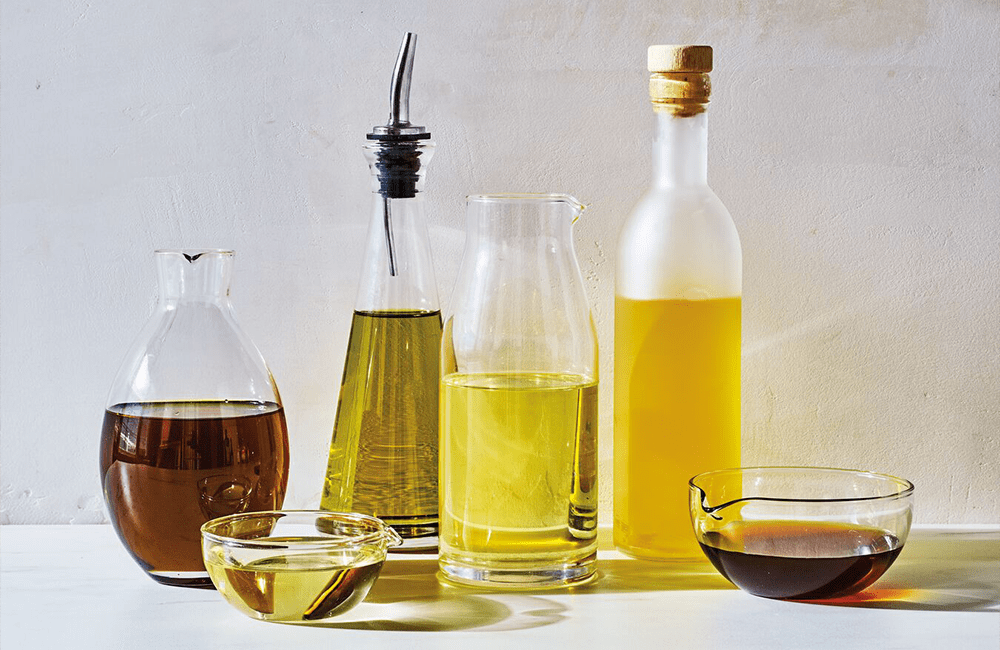
Cooking oils 101
How do you choose which ones to have on hand? We recommend starting with olive oil, then adding a neutral-flavoured one. It’s also fun to add a specialty oil, like sesame.
> Avocado oil: Excellent for high-heat cooking, marinades, and dressings.
> Olive oil: A must-have for Mediterranean cooking. Flavours vary from peppery to buttery, so taste to find your favourite.
> Sesame oil: Use when deep sesame flavour is needed.
> Sunflower oil: Perfect when a neutral-flavoured oil is needed. It has a high smoke point, making it a great choice for high-heat cooking.
> Canola oil: Great for when neutral-flavoured oil is needed in sauces. Also good for cooking over moderate heat.
> Corn oil: This all-purpose oil can be used for everything from sauces to low-temperature cooking.
Produce and pulese
- Veggies: What’s at the core of any healthpromoting pattern of eating? Fresh produce, starting with vegetables. The Mediterranean way of eating changes up the ratio of veggies to all other foods on your plate by giving them a starring role in all your meals and snacks. You’ll eat vegetables roasted, sautéed, steamed, and added in as an extra flavour-booster on top of pizza, pasta, and whole grains to make for a more satisfying meal—no matter the recipe. Think dark green leafy vegetables such as broccoli and spinach, tomatoes (and minimally processed products made from them, such as passata), garlic and onions.
- Pluses (legumes): These starchy veggies are also technically protein and include beans, lentils, peas, and chickpeas. They serve as a staple across the Mediterranean and can be easily swapped for animal protein in meals and snacks. They are a source of key minerals linked to blood pressure regulation and provide B vitamins and antioxidants that you need to support general health and immunity. Plus, legumes are a simple, affordable addition to almost any meal or snack. Think of incorporating chickpeas, cannellini beans, red and green lentils, red kidney beans, borlotti beans and split peas.
- Fruit: Fresh fruit will also be a mainstay, providing filling fibre and immune-protective antioxidants in snacks, meals, and, yes, desserts! Think oranges and other citrus fruits, peaches, apricots, apples, pomegranates, berries, grapes, figs, dates and olives.
Protein
- Seafood: Fatty fish (like salmon, tuna, sardines, herring, and trout) plus crustaceans and mollusks (prawns, scallops, mussels, and lobster) have anti-inflammatory benefits that help support overall immunity. That’s thanks to the fact that they’re chock-full of omega-3 unsaturated fats, which have been linked to a whole host of benefits, including reducing risks of chronic diseases and boosting cognition.
- Poultry, eggs plain (unsweetended) dairy products and lean beef: These are weekly staples of Mediterranean cuisine, but they’re not emphasised daily, as they tend to be in Western countries. When simply considering eating more seafood and plant-based meals, you might naturally find yourself leaning less on other sources of protein, without even trying.
Whole grains and pasta
- Grains: The other key difference between a Mediterranean eating plan and what we’re used to in Western countries: filling, B vitamin– packed whole grains, which also deliver key minerals that we need for heart health and neurological function. Delicious options include feekeh (roasted green wheat), barley, oats, buckwheat, millet, polenta, burghul (cracked wheat), brown rice and wholemeal pasta.
- Pasta: Another Mediterranean mandate we love? Mangia la pasta! Mediterranean diets don’t skimp on this classic—they just up the proportion of vegetables to starches. Start by halving a restaurant-size pasta portion, then cook pasta al dente and double up on the veggies you’re adding to the sauce (or sauté pan). You’ll fill out your dish with extra veggies and legumes to help you stay satisfied so you won’t feel deprived.
Conscious indulgences
- Desserts and drinks: The beauty of the Mediterranean diet is that it’s inclusive, not exclusive! Desserts are definitely on the menu, just emphasising quality of ingredients over quantity. The diet also limits the ultra-processed stuff and concentrated sugar in the form of beverages: Drink unlimited amounts of water, sparkling water, and fruit-infused H2O like the ones below.
- Red meat and dairy: Decadent cheeses and processed or red meats are enjoyed regularly on a Mediterranean diet, but in small portion sizes. By prioritising quality over quantity, this way of eating encourages you to be selective with where your saturated fat is coming from!
- Wine and alcohol: One five-ounce glass of wine (or 1½ ounces of any spirit) per day for women, and up to two glasses for men, is an optional part of the food culture in many Mediterranean countries. Research has linked moderate alcohol intake to reduced risks of chronic diseases, so choosing to imbibe as a part of your meal can be health-promoting and fun.
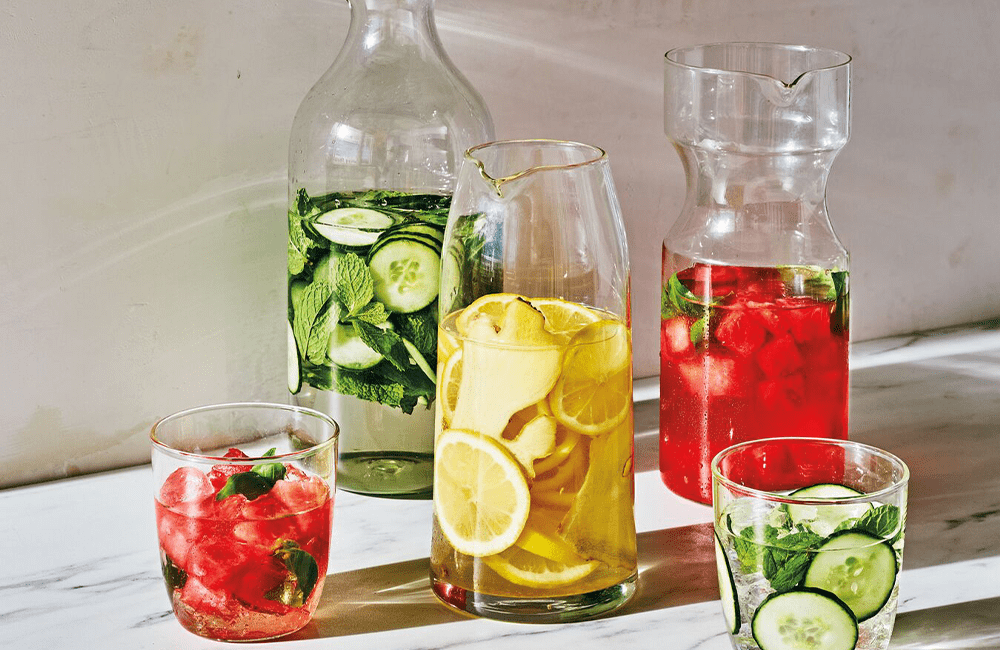
Explore fruit-infused waters
Hydration is key to just about everything—from staying energised and alert to keeping your digestive system working. Plus, drinking water instead of sugary beverages can help you lose weight. But sipping plain old H2O may not always appeal. Enter Mediterranean-inspired fruit infusions that make any glass of water extra refreshing. Start with these ideas, then experiment with other combos of fruit and herbs.
> Cucumber and mint
> Watermelon and basil
> Lemon and ginger
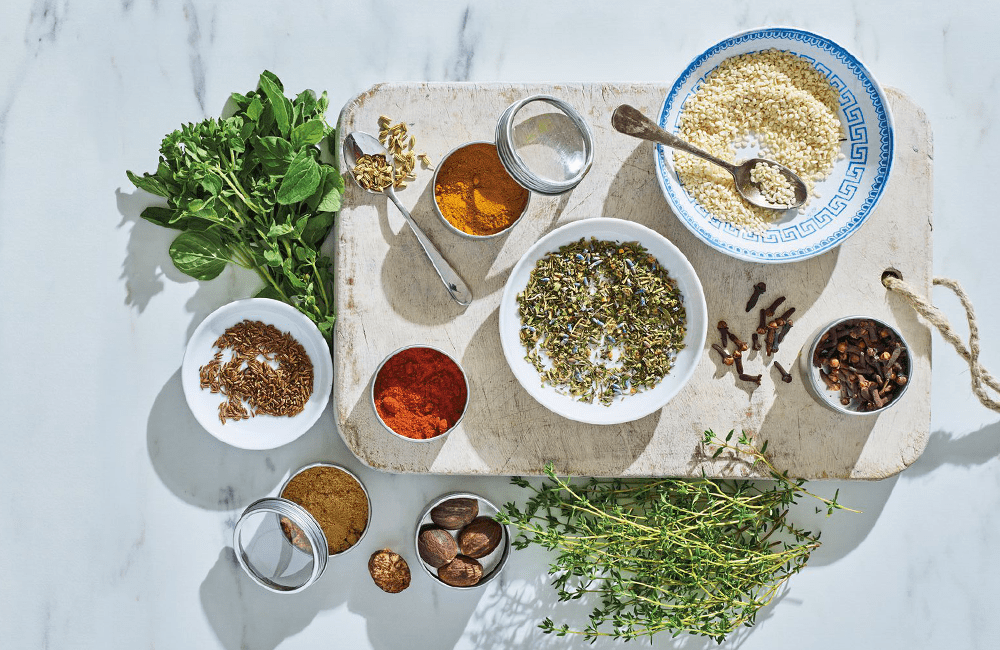
Explore herbs, spices and sauces
Using herbs and spices is a simple and delicious way to explore cuisines around the world—and that’s especially true of Mediterranean cooking. Plus, adding herbs and spices brings flavour without extra Points and helps you naturally cut back on the amounts of salt and fat needed, making every bite so tasty, you won’t miss them.
> Blends: Try some of the many spice blends available in markets. Instead of a long list of spices, you can reach for just one jar, like herbes de Provence, a French herb-and spice blend, or ras el hanout, a Moroccan blend of savoury and sweet spices. Za’atar is a blend of herbs, sumac, and sesame seeds.
> Fresh herbs: From tender tarragon, coriander, and parsley to bay leaves and rosemary, fresh herbs add bright flavours and gorgeous colour. Herbs also contain plant-based phytonutrient antioxidants.
> Spices: It’s kind of amazing what can happen to food when you add just a pinch of spice—each individual spice adds a delicious complexity to recipes.
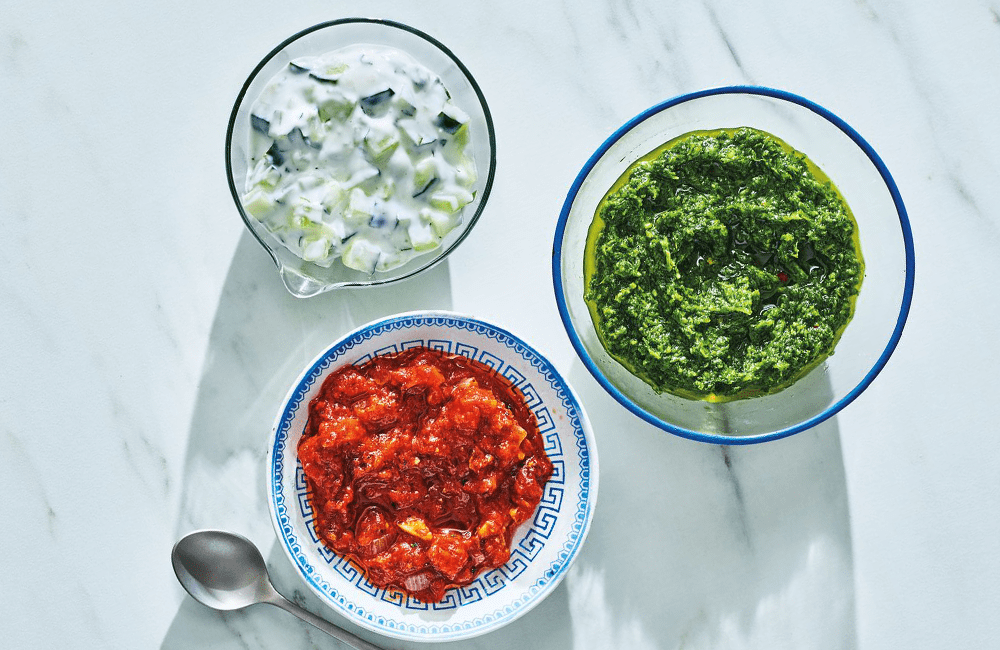
> Ttzatziki: Greek tzatziki, called cacik in Turkey, is a refreshing sauce of yoghurt and cucumber that’s often served as a dip with pita bread or on the side with kebabs and falafel.
> Salsa verde: Just a spoonful of herb-packed Italian salsa verde will elevate everything from grilled meats and fish to a plate of vegetables and a pot of rice.
> Chraime: This spicy tomato sauce from Libya is often served with fish, but it can also go vegan when paired with firm tofu.
